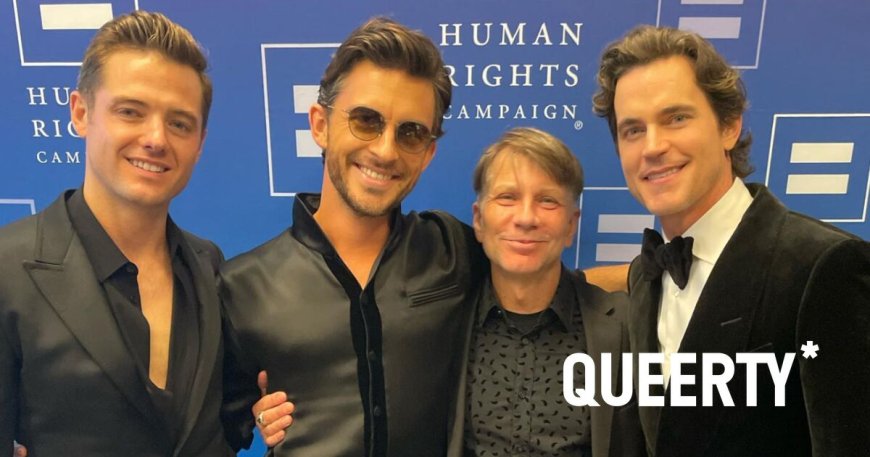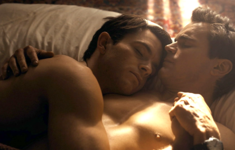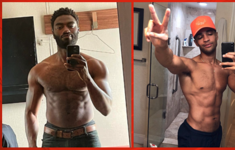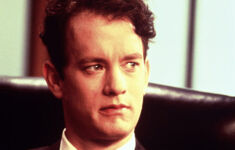‘Fellow Travelers’ creator Ron Nyswaner on gay life in the ’60s & ’70s, why AIDS stories still matter & more
On World AIDS Day 2023, the 'Philadelphia' screenwriter reflects on his trailblazing film, 30 years later, and his full-circle moment with 'Fellow Travelers.'


***Caution: Minor spoilers ahead for Fellow Travelers up through episode six, “Beyond Measure.”***
Fellow Travelers has left the 1950s behind—but the story of Hawkins “Hawk” Fuller and Tim Laughlin is far from over.
In its latest episode, “Beyond Measure,” the celebrated Showtime drama picks up in 1968, where Tim (Jonathan Bailey), dressed in his priestly best, gets busted by the cops as he burns draft cards in protest of the Vietnam War. Hawk (Matt Bomer), meanwhile, is living in a big suburban home with his wife, Lucy (Allison Williams), and their two kids, Kim and Jackson, when he learns of his old flame’s troubles.
If you’re familiar with the namesake ’07 novel the series is based on, you’ll know this is all new territory.
Outside of a brief preface in the ’80s, author Thomas Mallon’s tale of a fiery—and secretive—gay love affair unfolds entirely in the ’50s where two D.C. government employees hook up (and then hook up again… and again and again) right under the nose of a fear-mongering Senator Joseph McCarthy and amidst the very real threat of the Lavender Scare.
But, in adapting Mallon’s evocative words for the screen, veteran filmmaker and Oscar award-nominated screenwriter Thomas Mallon sought to follow the threads of these so-called “fellow travelers” further still, imagining later points in Hawk and Tim’s lives where their paths cross yet again, and giving viewers immersive glimpses into different eras of gay American culture along the way.
For Nyswaner, this was both a way to satisfy his own curiosity about the fates of these characters he became so enamored with, but also to tell an even deeper and richer story about the evolution of our LGBTQ+ community during a time of great societal change, drawing from his own life—and the lives of so many who have paved the way for us all.
This noted deviation from the source presented the perfect opportunity for Queerty to check in with Nyswaner about the ground Fellow Travelers has covered thus far, his personal connections to the uncharted road ahead, and, yes, all of the hubbub around the series’ very steamy sex scenes.
And, with the 30th anniversary of Philadelphia (which earned that aforementioned Oscar nod for his script, among others) approaching this month, we couldn’t resist a trip down memory lane. Nyswaner reflects on the legacy of his career-making movie, its full-circle moment with Fellow Travelers, and why stories about AIDS are still so crucial for our community, on World AIDS Day and beyond.

QUEERTY: Ron, it’s so wonderful to meet you—congrats on such a lovely series. What have you made of the response so far? What’s surprised you most?
RON NYSWANER: That’s a really interesting question—I am certainly pleased with the response. I describe the feeling as this, like, “Phew, we got away with it. It worked!” You know? Just a sigh of relief in a way because, even though I really felt that we were all we were making something good—I felt it on set, I felt it in post-production, the early reactions were pretty positive—you just don’t know.
And you, one, can’t depend on how people react to things. But I also think it has to be something that’s presented to the world a certain time, and the synchronicity of that. So, I’m glad that the beautiful work of my cast and crew and designers and directors is being embraced.

That’s interesting that you brought up this idea of “synchronicity,” because so much of what’s explored in this series is, yes, pulled directly from our past, our history, but with these parallels to what we’re going through right now—this “Don’t Say Gay” ideology seeping into different corners of our lives, people losing jobs over certain beliefs, anxiety over what next year’s election has in store…
Oh, certainly! I was inspired to try to do this 11 years ago, and my managers at Anonymous Content optioned the book for me, but then I got pulled into the need to actually pay my rent. [Laughs.] You know, in development we pitch, which you do for free, so I got swept into two very, very high caliber television shows—Ray Donovan and then Homeland—and then doing a few other things and movie scripts along the way. And Fellow Travelers was always sitting there.
So it’s kind of interesting that it happened when it happened, because obviously there’s a resonance to even these very specific details. You know, one of our main supporting characters is Roy Cohn, who played a big part in Joseph McCarthy’s career and played a big part in the career of he-whose-name-I-do-not-mention—for shorthand, I just call him the Antichrist…
Anyway, that connection to Roy Cohn—and his philosophy of, just, fight and fight and fight and do whatever you can to get to win—we explore a little bit about what might have formed, I think, self-hating man who then hated other people in his path.
And, regarding the scope of the series, this week’s episode is really where, on a story level, we start to divert or build off of what’s in the source novel. Could you tell us a little bit about how that decision was made, and what you hoped to flesh out by exploring these other points in Hawk and Tim’s lives?
Well, Mr. Mallon’s beautiful book concerns itself almost exclusively with a 1950s. He does have a little preface where Hawkins, as we meet him, he’s in his 60s and he learns some bad news about Tim. But that’s just a preface and they never connect.
And that led me to think, well, what would it be like if Hawk actually saw Tim in the 1980s? And then, because AIDS was one of the primary formative experiences of my life—not only my personal life, but also my professional life with Philadelphia—I naturally said, “Well, there’s a parallel between the Lavender Scare and the AIDS crisis.” In one, our government basically actively persecuted us. In the AIDS crisis, our government persecuted us by omission, by neglecting. So, that just seemed very natural.
And I also thought, well, do we just want to have 33 years [of Hawk and Tim’s lives] go by? Or, do we want to see what happened to them at other points? So, then I sort of landed on an episode in 1968, and an episode 1979, while constantly still toggling between the ’50s and the ’80s going. And, to be quite honest, it just felt like it would be fun.

Oh, of course. By the time this first major time jump comes around, you do have such affection for these characters and their relationships, you do naturally want to know what they’ve been up to. Especially as we dive into the ’60s and ’70s, were there elements of those eras you were most eager to explore?
So, in 1968, I was pretty young—I was 12. But I certainly remember the music of the time, and the Vietnam War. And, because of who I am and my politics—even growing up in coal mine, Pennsylvania—I was the “radical” in school, which probably meant i was just against the dress code or something. [Laughs.]
But actually, no, I was wearing a [’72 Democratic presidential ticket] McGovern-Shriver pin pretty early in my life, I was definitely against the Vietnam War, I was asked to sit in the back of my homeroom because I wouldn’t say the Pledge of Allegiance.
So, anyway, the late ’60s thing just really appealed to me. Because I was also a very fervent Christian—I went to church camp, and Jesus Camp, and I had the Campus Crusade for Christ with their conventions and stuff like that. So I was very much like Tim in the ’60s: I was this weird mix of really leftwing politics and also a speaking-in-tongues Christian.
And as Tim was progressing in his spiritual development, I knew where we were going to end up—that Tim was going to end up in a way that he could resolve his love of God and his absolute acceptance of himself as a homosexual. But I thought it’d be interesting to see—in the ’60s and then in the ’70s—where he is experimenting with different versions of that. So that’s why he’s in seminary when we meet him in 1968 and he’s quote-unquote celibate. But to Hawkins Fuller, that’s just a challenge. [Laughs.]
Then I thought, in the ’70s, Tim has found himself by then. I was out of the closet 1978—and I’m not saying Tim is me, but I just I knew coming out around then, going to the discos and just dancing all night to Donna Summer, meeting all these guys with all the potential romances and sexual adventures and all that kind of stuff… it was so liberating! So I wanted to touch on that as well. My personal life informs these two episodes, especially.
You joked about Tim’s failed attempt at celibacy, which I think is as good a segue as any to talk about the role of sex in the series, which has certainly inspired its fair share of ink, but is also so instructive to the evolving relationships of these characters—not just Hawk and Tim, but Hawk and Lucy, Marcus and Frankie. Did you go into this series with certain ideas about how you wanted to portray sex in this story?
I think there could be something sacred about sex. I think what we’re all looking for—and certainly Tim is looking for—moments of ecstasy, moments where you sort of move outside yourself. I had that in my religion, and I had that in love—and that’s the scariest one. But I do think, when I came out in in the late ’70s, the celebratory sex wasn’t solely hedonistic, it wasn’t just about the pleasure—it was about the connecting to a whole community of men who were outside of society, and yet were thriving and celebrating who they were through their sexual behavior.
Then came AIDS, which is when people said, “your sexual behavior is the very thing that is causing you to die,” and many people even said, “and you deserve to die.” So I wanted to really address that provocative celebration of sex—sometimes with a stranger, sometimes with somebody that you love.
But our approach to sex is that it isn’t there just to be provocative. None of our sex scenes are because, “hey, it’s 20 minutes in let’s show some skin” It wasn’t, “well, it’ll get lots of social media response!” None of that was considered. Every sex scene has to tell a story, has to move this story forward in some way—and that was a rule.
And the other rule was: every sex scene is about exchanging power. And when Hawk and Lucy have sex in episode six, she’s implied something about him and then he says, “Okay, now I have to prove you wrong. I have to do the thing.” She’s in charge, basically. And, as we see Tim, grow, he’s in charge, he gains power throughout the whole show, over Hawk. So, in the ’80s sequences, Tim really is the one who has power, because Hawk has come asking for something.
Related:
Jonathan Bailey reveals the deeper meaning to his explicit scenes with Matt Bomer in ‘Fellow Travelers’
Jonathan Bailey gave a master class on why the graphic intimate scenes in ‘Fellow Travelers’ are vital to the story.
Of late, there’s been this ongoing debate online about whether or not sex scenes are necessary in film and television, but Fellow Travelers is a case where it’s really an essential fabric of the story.
Well, I’m proud to say: I think if you took the sex scenes out of the episodes, you would have to create a dialogue scene where something happens between the characters, so we understand how they got to the next place. So, yes, that actually says to me our sex scenes are absolutely essential to the show. You couldn’t remove them and show the episode—it just wouldn’t make sense.
And, of course, credit is also due to your actors for committing themselves so fully to the story. It seems part of why it’s been embraced the way that it has is because you actually have LGBTQ+ performers in these roles, bringing a sense of authenticity to everything we see on screen. Was that important to you in the casting process?
Well, Matt came on board early—he was there at the very beginning and he’s an [Executive Producer.] For three years—poor Matt—we kept saying, “Oh, can you make sure you don’t take [another project] that will happen now?” You know, he’s juggling his schedule and family, et cetera, et cetera, for three years.
And, in all the other casting—I think all of our LGBTQ+ characters are played by LGBTQ+ characters—it was a strong preference, but not a requirement. And, you know, you can’t ask; the casting director can’t call the agent say, ‘hey, are they LGBTQ?’ You’re not allowed to ask that question. But Robbie Rogers—my incredible, valued partner in everything Fellow Travelers for the last four years—we would talk about certain actions that we liked, and he’d go on Instagram and he’s say, ” Oh yeah, they follow me and Greg [Berlanti, his husband]—they’re gay.” [Laughs.]
Your gay litmus test, of sorts!
Oh yeah, exactly. [Laughs.] So we had our little way in to figure it out. But, luckily, everybody who came to their roles were perfect for the parts and are LGBTQ+. So that’s a gift.
Related:
Get to know the suave supporting players of ‘Fellow Travelers’: Jelani Alladin & Noah J. Ricketts
The gorgeous Broadway veterans step into the spotlight in ‘Fellow Travelers” latest episode.
And everyone’s excellent. There’s a lot of talk, of course, of Matt and Jonathan, but then you have these talented, seasoned broadway performers like Jelani Alladin and Noah S. Ricketts who really get a chance to shine here, too.
Yeah, and you may know there weren’t Black characters in the book—I think because Mr. Mallon was talking about a certain world at a certain time. But I just felt obliged—I just didn’t think that felt quite right for [this version of the story]. But also, doing the research, it was fascinating and compelling and intriguing and dangerous to be white and gay in the 1950s—so what the heck was it like to be Black and gay? So we dove into that research and created Marcus and Frankie.
Jelani kept a journal in Marcus’s voice throughout shooting, and he would come into my office on occasion and read from his journal, which, some times I’d say, “Can I take that and put it in a scene?”
And Marcus serves as this really great foil to Hawk. I don’t go on social media, but people keep sending me things with people saying they love that element, like, “Oh, that Marcus really takes Hawk down a peg and puts him in his place!” [Laughs.] And that’s a fun dynamic they continue for years, really.

Speaking of casting: This month marks 30 years since the debut of your film, Philadelphia, which remains an important piece of cinema for many reasons. It wasn’t too long ago that Tom Hanks was asked about the film and, despite being very proud of it, basically said that’s a role a straight man couldn’t play now. Do you agree with that sentiment?
Well, if the question is put to me, like, do I think people should only cast LGBTQ+ actors in those roles? What I have said is that I don’t tell other people want to do, you know? I’m not one of those who goes on social media and pontificates and criticizes and calls out people because I don’t agree with their choices. But, for me, moving forward, I will always make a very, very strenuous effort to find LGBTQ+ actors for LGBTQ+ roles. But I am not ruling out the fact that somebody else might step into a role and be perfect for it.
I do think that there was a kind of shorthand with the relationships between Marcus and Frankie and Hawk and Tim where we didn’t have to say, “Look, hey, so a gay guy in that situation would probably not touch that…” You know what I mean? They didn’t need an instruction. [Laughs.] So, there was a shorthand and the ease to it I think.
Beyond the casting conversation, what does a movie like Philadelphia mean to you now? It earned you an Oscar nomination, you’ve credited it with making you career—is it a film you can say you’re proud of 30 years on?
I haven’t seen in a long time, but I certainly know it very well. And, you know, making it was such an extraordinary experience that I still have a circle of friends that I see regularly who all met on the set of Philadelphia, because we’re still in touch and we all loved [director] Johnathan Demme so much.
And I still have this experience—it happened six months ago in Toronto, where a 30-year-old man said to me, “Oh, you wrote Philadelphia! That movie is very significant to my life.” And I said, “How’s that even possible? You were born when we were making it!” He was from San Salvador, and he told me that he saw it in high school in class—something told me that a closeted gay priest must of shown it, [laughs,] because it was an all-boys Catholic High School. He said, “I didn’t think I knew what I was, but I didn’t know people would actually have a conversation about it in public.” And he did say, “When I saw Tom Hanks playing that role, I knew I’d be okay”—you know, I just got choked up now telling that story.
And that’s when you think, well, something bigger than me happened—bigger than myself and Jonathan. And I know, at the time it was released, it disappointed some people for all these different reasons. But, hey, when 30 years later, someone is telling you “thank you” for doing something, you don’t worry about what you didn’t do right, you just feel grateful that you did it at all.
Related:
‘Philadelphia’ at 25: Ron Nyswaner reflects on the movie that changed America
The Academy Award-nominee opens up about the cast, making the film, homophobia on set and the legacy of Hollywood’s first film about AIDS.
It’s so fascinating to have Fellow Travelers airing now, in the lead-up to the film’s 30th anniversary, because in many ways they’re re in conversation with each other. When Philadelphia hit theaters, tens of thousands of people were still dying from AIDS every year. Of course, thanks to advancements in medicine and healthcare, that’s no longer the case, but why do you think telling stories like these still matters?
Well, because people are forgetting about AIDS. And, you know, we all stand on the shoulders of people that came before us. I really believe in history and I love history—you know, coming out in 1977 in going to my first gay demonstration against Anita Bryant, I was standing on the shoulders of the people at ’69 who threw rocks at the police at Stonewall. They were standing on the shoulders of people like Frank Kameny, who created the Mattachine Society in the ’50s. So it’s important for us to know!
But Fellow Travelers, specifically I would say, is about the celebration of love. It’s not this dreary history lesson. I had another rule, which is that there are no noble victims—there are no victims on the set of Fellow Travelers. We’re not playing victims. We’re playing people who loved and had sex and thrived in some of the darkest times—and had joy and friendship in some of the darkest times of our community’s history. And that’s what I think, if you watch Fellow Travelers, I hope you come away with—especially in our last scene—feeling so moved by your own community.
I’ll tell you something that we did in the main title sequence—which I’m very, very proud of. Many of those photographs of gay couples are from that beautiful book Loving. So those are our people that we’re featuring in the show. Every episode ends with a song when we go to black, a song by somebody who died of AIDS: Arthur Russell, Sylvester, Freddie Mercury, Michael Callen.
So this is a celebration of our survival, and thriving through dark times. That’s why I think it’s not just another sad story about how hard it is to be homosexual—I mean, I wouldn’t go see that. That sounds so boring. This is about love.
And I also will say one more thing: I’ve spent my whole life in this identity. I love being a homosexual, to use the old-fashioned word. I love it! But I also believe that there are there are qualities that transcend our identities.
We would often on the set of Fellow Travelers: “We’re not making a LGBTQ+ drama, we’re making a human drama.” Because everybody faces love, loss, grief, sadness, life, death—all of it. We embrace our identities, we fight for them, but we have to be reminded that we’re part of something bigger. Our DNA is almost the same, all human beings. So I don’t know if that’s a politically correct philosophy to have these days—probably in some circles, not—I think our identity is great to celebrate, but we also need to be reminded that there’s more. We have another community, which is the human community.
New episodes of Fellow Travelers premiere every Friday on Paramount+ and then air every Sunday night on Showtime.
The above interview has been edited and condensed for clarity.

 Mark
Mark 








